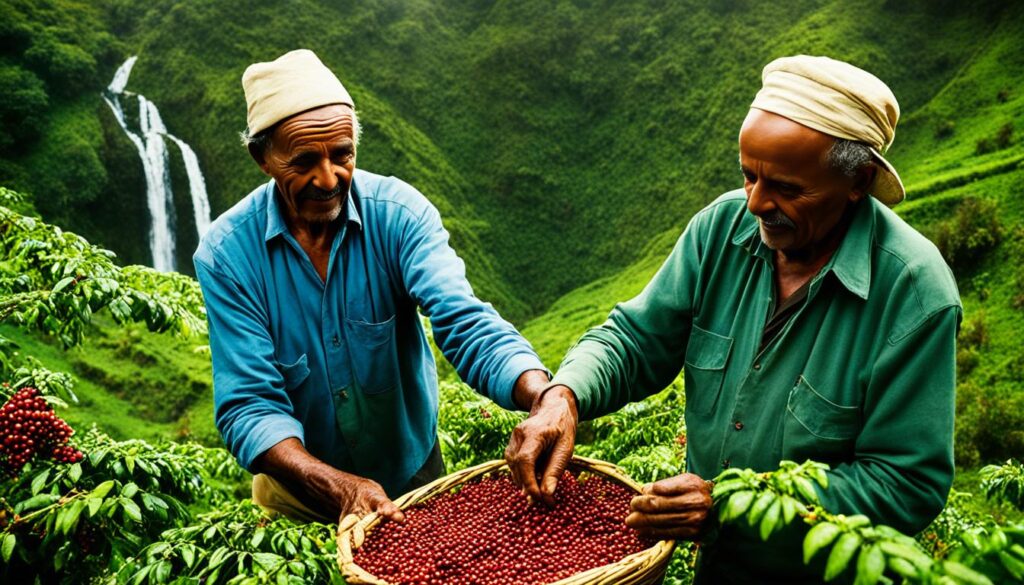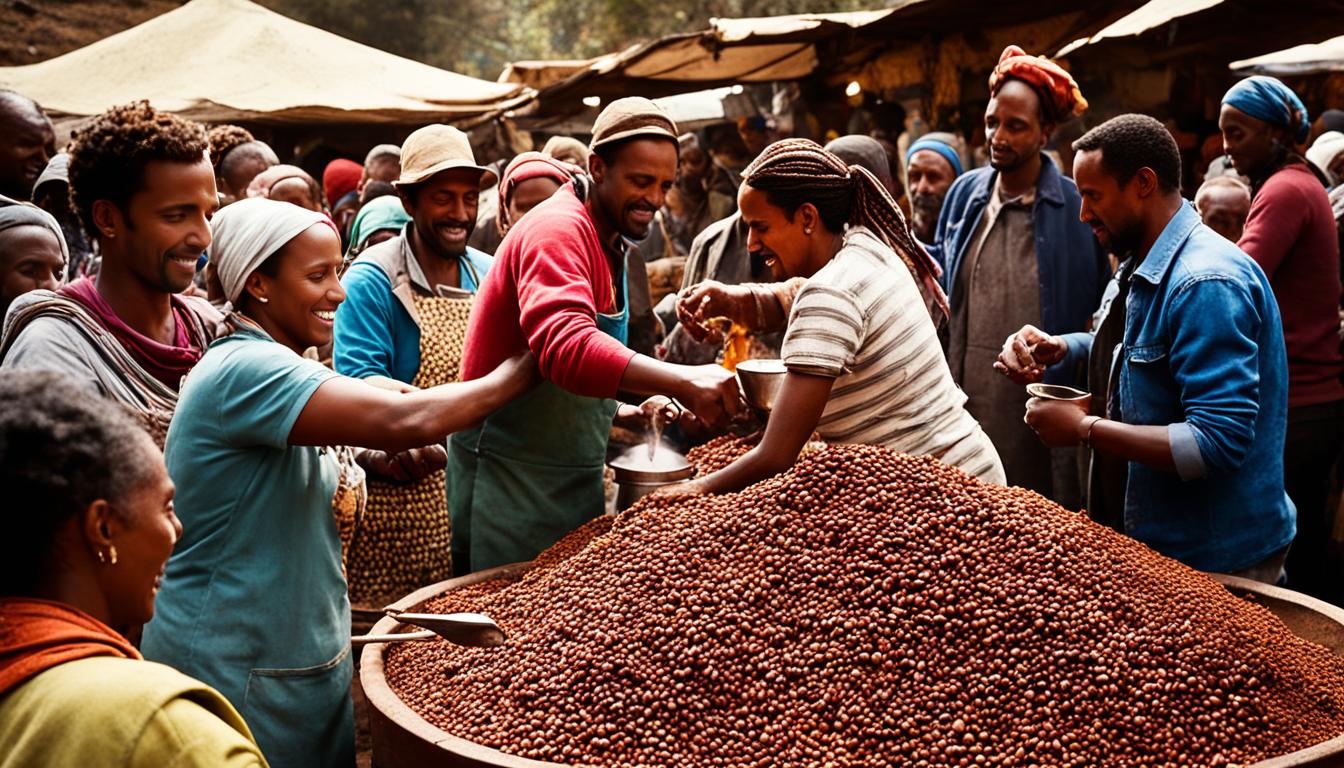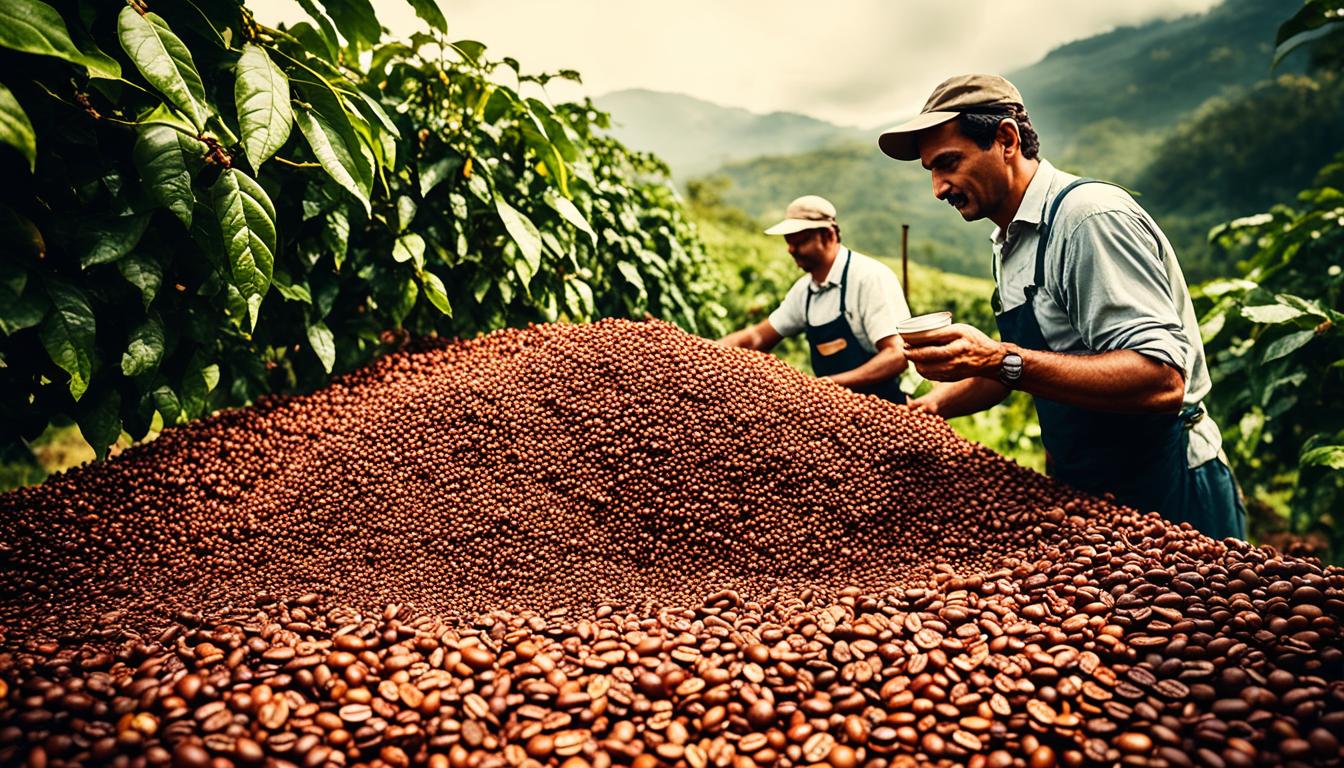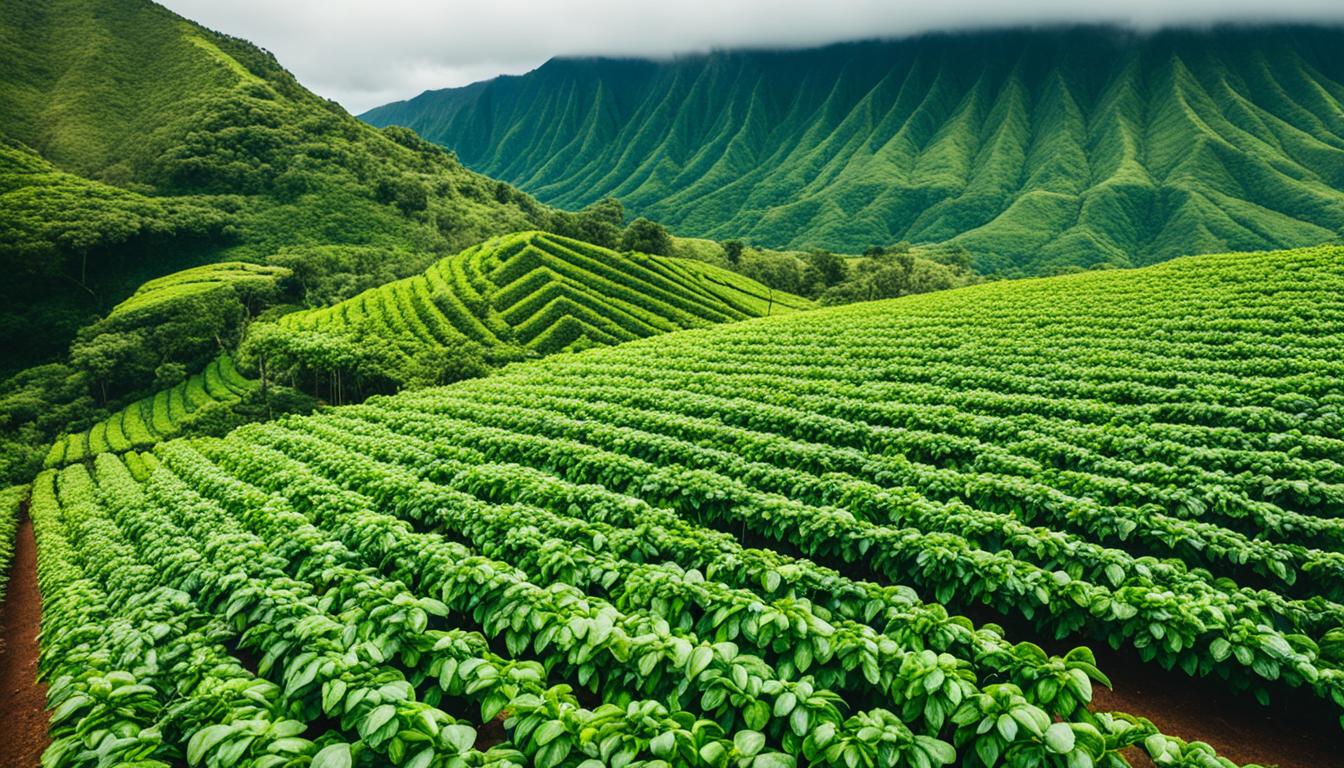Welcome to our comprehensive guide to the rich and vibrant Ethiopian coffee culture. In this article, we will take you on a journey through the origins, traditions, and specialties of Ethiopian coffee. From the traditional coffee ceremonies to the thriving coffee industry, Ethiopia has a deep-rooted coffee culture that has captivated coffee enthusiasts around the world.
In Ethiopia, coffee is more than just a beverage. It is a symbol of hospitality, friendship, and community. The country’s coffee origins date back centuries, and its unique coffee farming practices have contributed to the production of exceptional Ethiopian coffee beans.
One of the highlights of Ethiopian coffee culture is the traditional coffee ceremony. It is a time-honored ritual that brings together friends, family, and neighbors to share in the experience of freshly brewed coffee. The ceremony involves roasting the coffee beans, grinding them, and brewing the coffee in a traditional coffee pot known as a jebena. The aroma and flavors of the coffee are savored, and conversations flow freely.
When it comes to specialty coffee, Ethiopia is renowned for its diverse and exquisite offerings. Ethiopian coffee beans are known for their distinct flavors and aromas, ranging from fruity and floral to bold and spicy. The country’s unique microclimates and cultivation methods contribute to the exceptional quality and characteristics of Ethiopian coffee.
Throughout history, coffee has played a significant role in the economic development of Ethiopia. It is one of the country’s major exports and a vital source of income for many farmers. The Ethiopian coffee industry continues to thrive, with a growing focus on sustainability and fair trade practices.
If you’re looking for an authentic Ethiopian coffee experience, you can explore the bustling coffee houses in cities like Addis Ababa, where you’ll find a vibrant coffee culture and an array of coffee varieties to choose from. Whether you’re a seasoned coffee connoisseur or simply curious to discover the wonders of Ethiopian coffee, this guide will provide you with insights and knowledge to enhance your appreciation of this remarkable coffee culture.
Key Takeaways:
- Ethiopia has a rich and vibrant coffee culture, rooted in centuries of tradition and history.
- The traditional Ethiopian coffee ceremony is a time-honored ritual that brings people together to share in the joy of coffee.
- Ethiopian coffee is known for its exceptional flavors and aromas, with a wide range of varieties to explore.
- The Ethiopian coffee industry plays a significant role in the country’s economy, providing livelihoods for many farmers.
- By embracing Ethiopian coffee, you can support sustainable farming practices and contribute to the well-being of local communities.
The History of Specialty Coffee in Ethiopia
Legend has it that a goat herder named Kaldi discovered the invigorating properties of coffee when his goats became energized after eating coffee cherries. As early as the 9th century, Ethiopian monks were brewing coffee as part of their spiritual practices. Today, Ethiopia is the world’s sixth-largest coffee producer.
Ethiopian Coffee Culture and its rich history are intrinsically linked to the origins of coffee itself. The tale of Kaldi, the goat herder, highlights the serendipitous discovery of coffee’s stimulating effects. As the legend goes, Kaldi noticed his goats exhibiting an unusual burst of energy after consuming the vibrant red cherries from a particular shrub. Intrigued by his goat’s antics, Kaldi decided to try the cherries himself, soon experiencing enhanced alertness and a newfound sense of vitality. News of this magical fruit spread, and the consumption of coffee cherries became more widespread.
It wasn’t long before coffee became woven into the fabric of Ethiopian society. In the 9th century, Ethiopian monks began brewing coffee as part of their spiritual rituals. These early coffee ceremonies symbolized the connection between the spiritual and the physical realms, providing a sense of awakening and renewal.
Today, Ethiopia proudly retains its position as one of the world’s top coffee producers, renowned for its specialty coffee varieties. The Ethiopian coffee heritage prevails, with farmers diligently nurturing these cherished beans to maintain their exceptional quality. The distinct flavors and aromas derived from the Ethiopian coffee beans are a testament to the country’s unique coffee-growing conditions and traditional farming practices.
The Ethiopian coffee industry continues to evolve, incorporating modern techniques while honoring their deep-rooted traditions. Coffee production in Ethiopia follows a meticulous process, from cultivation to harvest and processing. The intricate stages involved in producing Ethiopian coffee contribute to its exceptional taste and allure.
Ethiopian Coffee Origins
Ethiopia’s coffee heritage dates back centuries, making it the perfect place for specialty coffee to flourish. The country’s diverse microclimates, featuring varying altitudes, rainfall patterns, and fertile soil, create the ideal conditions for the growth of the Coffea arabica plant. This species is responsible for the rich, nuanced flavors characteristic of Ethiopian coffee.
The Journey from Farm to Cup
| Stage | Description |
|---|---|
| Cultivation | Ethiopian coffee farmers carefully cultivate and tend to their coffee plants, ensuring optimal growth and development. |
| Harvesting | The coffee cherries are meticulously hand-picked at the peak of ripeness, ensuring the utmost quality. |
| Processing | Various processing methods, such as the natural process, washed process, and honey process, are employed to remove the outer layers of the coffee cherry and reveal the prized coffee bean. |
| Drying | The coffee beans are carefully dried, either through sun-drying or mechanical drying, to reduce moisture content and preserve their flavors. |
| Sorting and Grading | The coffee beans undergo meticulous sorting and grading processes to ensure consistency and quality. |
| Roasting | The green coffee beans are expertly roasted to bring out their unique flavors and aromas. |
| Brewing | Finally, the roasted coffee beans are ground and brewed into a delicious cup of Ethiopian coffee, ready to be savored. |
Each step in the journey from farm to cup contributes to the complex and delightful flavors that Ethiopian coffee is known for. The commitment to quality and craftsmanship throughout this process is a testament to the Ethiopian coffee industry’s dedication to preserving their rich coffee heritage.
The Colorful Varieties of Coffee Grown in Ethiopia
Ethiopia, known as the birthplace of coffee, is renowned for its diverse coffee varieties that offer a kaleidoscope of flavors and aromas. From the delicate floral and fruity notes of Yirgacheffe coffee to the wine-like acidity and berry undertones of Sidamo coffee, and the distinctively bold and spicy flavor profile of Harrar coffee, Ethiopian coffee embodies a vibrant and captivating coffee culture.

| Coffee Variety | Flavor Profile |
|---|---|
| Yirgacheffe | Delicate floral and fruity notes |
| Sidamo | Wine-like acidity and berry undertones |
| Harrar | Distinctively bold and spicy |
H3: Discovering Yirgacheffe Coffee
Grown in the southern region of Ethiopia, Yirgacheffe coffee is celebrated for its enchanting aroma and complex flavor profile. It is often described as having a bright acidity with notes of bergamot, jasmine, and ripe fruit. The coffee is produced by smallholder farmers who carefully cultivate the coffee cherries and employ traditional processing methods, which contribute to its exceptional quality.
H3: The Allure of Sidamo Coffee
Sidamo coffee, grown in the lush Sidamo region, is adored for its bright acidity and captivating berry undertones. Among the most popular Ethiopian coffee varieties, Sidamo beans are meticulously handpicked and sun-dried, highlighting the region’s unique terroir. The resulting cup boasts flavors of blueberry, citrus, and chocolate, creating a mesmerizing taste experience.
H3: Embracing Harrar Coffee
Harrar coffee, named after the region where it is grown, stands out with its intense and spicy flavor notes. Produced by dry-processing the coffee cherries, Harrar beans exhibit a full-bodied richness and a vibrant wine-like acidity. With hints of blueberry, dark chocolate, and spices, Harrar coffee offers a truly sensory journey for coffee connoisseurs.
Popular Coffee Processing Methods in Ethiopia
Ethiopia, with its rich coffee culture, employs various coffee processing methods that greatly influence the flavors and aromas of the final cup. Each method has its own unique characteristics that contribute to the diverse range of Ethiopian coffee offerings.
Natural Process
The natural process is a traditional method where the coffee cherries are left to dry naturally under the sun. After being carefully handpicked, the cherries are spread out on raised beds or patios to dry. This process allows the cherries to fully mature, resulting in a sweet and fruit-forward flavor profile. The natural process is known for its complexity, often showcasing notes of berries, tropical fruits, and floral undertones.
Washed Process
The washed process involves removing the outer skin and pulp of the coffee cherries before drying. After harvesting, the cherries are washed to remove any impurities. Next, the cherries undergo a fermentation process that helps break down the remaining fruit layer, revealing the coffee beans. This process results in crisp and clean flavors, highlighting the purity of the coffee. Washed process coffees often exhibit bright acidity and delicate, tea-like qualities.
Honey Process
The honey process is a middle ground between the natural and washed processes. After picking the cherries, the skin is removed, and the cherries are dried with some of the sticky fruit pulp still intact. This residue resembles the texture of honey, giving the process its name. The honey process tends to create rich and syrupy coffees with a balance of sweetness and acidity. It offers a complexity that resonates with those seeking unique and intriguing flavor profiles.
“The different coffee processing methods in Ethiopia play a crucial role in shaping the distinct flavors and characteristics of Ethiopian coffee. Whether it’s the sweet and fruity notes of the natural process, the clean and vibrant flavors of the washed process, or the complex and syrupy qualities of the honey process, each method offers a unique coffee experience.”
| Processing Method | Characteristics |
|---|---|
| Natural Process | Sweet, fruity, complex |
| Washed Process | Crisp, clean, bright acidity |
| Honey Process | Rich, syrupy, balanced sweetness |
Coffee Culture in Ethiopia
Ethiopian coffee culture is deeply ingrained in the country’s social fabric. The art of enjoying coffee goes beyond the simple act of drinking; it is a communal experience that brings people together to connect and bond over freshly brewed coffee.
One of the most iconic traditions in Ethiopian coffee culture is the coffee ceremony. This elaborate ritual is performed by a host or hostess, who carefully roasts, grinds, and brews the coffee in front of the guests. The ceremony involves multiple rounds of brewing, symbolizing the stages of life, and is accompanied by traditional Ethiopian snacks.
During the coffee ceremony, traditional coffee pots known as jebenas are used. These unique, clay pots have a distinctive shape and are decorated with intricate patterns. The jebena plays an integral role in brewing coffee, adding an authentic touch to the experience.
Aside from the intimate coffee ceremonies held at home, coffee houses in Ethiopia are bustling hubs where people gather to enjoy their favorite beverage. In cities like Addis Ababa, you’ll find a wide variety of coffee houses offering an array of Ethiopian coffee options.
Let’s take a look at some of the popular coffee houses in Ethiopia:
- Tomi Cafe: Located in the heart of Addis Ababa, Tomi Cafe is known for its relaxing atmosphere and excellent coffee selection. They source their beans from local farmers, ensuring a high-quality and authentic Ethiopian coffee experience.
- The Coffee House: With several locations across Ethiopia, The Coffee House is a favorite among locals and tourists alike. They offer a range of specialty coffees, including single-origin Ethiopian blends.
- Kaldi’s Coffee: Founded by Ethiopian coffee pioneer Amanuel Kaleab, Kaldi’s Coffee has become a household name in Ethiopia. They are dedicated to promoting Ethiopian coffee and are committed to sustainable practices.

Whether you’re sipping coffee at home or exploring the vibrant coffee houses in Ethiopia, the country’s coffee culture is a testament to its rich heritage and traditions.
Sustainable Coffee Practices in Ethiopia
Ethiopia, the birthplace of coffee, not only boasts a rich coffee culture but also leads the way in sustainable coffee production. With a commitment to organic farming practices and fair trade principles, Ethiopian coffee is not only a delight for your taste buds but also a choice that supports the environment and empowers local communities.
Organic Coffee Farming
In Ethiopia, organic coffee farming is the norm rather than the exception. Farmers cultivate coffee using traditional methods that prioritize the well-being of the ecosystem. By avoiding the use of synthetic pesticides, herbicides, and chemical fertilizers, Ethiopian coffee farmers preserve the integrity of the land and protect the health of consumers.
Fair Trade Coffee
Fair trade coffee practices are deeply ingrained in Ethiopia’s coffee industry. Farmers receive fair prices for their coffee beans, enabling them to invest in their communities and improve their living conditions. Fair trade certification ensures that Ethiopian coffee farmers are not exploited but rather valued for their hard work and dedication.
Community Empowerment
The Ethiopian coffee industry places a strong emphasis on community empowerment. The cooperative model is prevalent, wherein farmers come together to share resources and knowledge, improving their bargaining power and overall livelihoods. This collaborative approach fosters a sense of unity and solidarity among coffee-growing communities.
Through sustainable coffee practices, Ethiopia is championing the preservation of traditional farming methods and the well-being of its people. By choosing Ethiopian coffee, you contribute to the sustainable growth of the coffee industry and make a positive impact on the lives of coffee farmers and their communities.
| Benefits of Sustainable Coffee Practices in Ethiopia |
|---|
| Preservation of traditional farming methods |
| Protection of the environment |
| Improved living conditions for coffee farmers |
| Community empowerment and unity |
“Sustainable coffee practices in Ethiopia not only ensure the continuation of rich coffee traditions but also contribute to the well-being of coffee farmers and the environment.” – Ethiopian Coffee Association
Conclusion
Experience the allure and enchantment of Ethiopian Coffee Culture, a journey that will transport you to the birthplace of coffee. The rich heritage and traditions that surround Ethiopian coffee offer a truly authentic and unforgettable experience.
Indulge in the diverse flavors that Ethiopian coffee has to offer, from the delicate floral notes of Yirgacheffe to the bold and spicy undertones of Harrar. Each sip is a testament to the centuries-old artistry and meticulous cultivation that goes into producing exceptional Ethiopian coffee beans.
The global appreciation of Ethiopian coffee is a testament to its exceptional quality and unique taste. Coffee lovers worldwide have embraced the Ethiopian coffee experience, recognizing it as a true delight for the senses.
Immerse yourself in the elegance of Ethiopian coffee, whether through the captivating coffee ceremonies that bring communities together or by enjoying a cup at one of the vibrant coffee houses in Ethiopia. By embracing the Ethiopian coffee culture, we contribute to the sustainability of the industry and the well-being of local communities.
FAQ
What is the history of coffee in Ethiopia?
Ethiopia is the birthplace of coffee, with legends dating back to a goat herder named Kaldi discovering its energizing properties. Ethiopian monks brewed coffee as part of their spiritual practices as early as the 9th century.
What are the different varieties of coffee grown in Ethiopia?
Ethiopia is home to a diverse range of coffee varieties, including Yirgacheffe with delicate floral and fruity notes, Sidamo with wine-like acidity and berry undertones, and Harrar with a bold and spicy flavor profile.
What are the coffee processing methods used in Ethiopia?
Ethiopian coffee can be processed through the natural method, where cherries are sun-dried, resulting in a sweet and fruit-forward taste. The washed method involves removing the cherries’ skin and pulp for vibrant and clean flavors, while the honey process offers a balance of flavors with complex and syrupy undertones.
How important are coffee ceremonies in Ethiopian culture?
Coffee ceremonies are integral to Ethiopian culture, bringing people together to bond over freshly brewed coffee. Traditional coffee pots called jebenas are used for a more authentic experience, and coffee houses in cities like Addis Ababa provide vibrant social environments to enjoy Ethiopian coffee.
What are sustainable coffee practices in Ethiopia?
Ethiopia is at the forefront of sustainable coffee production, with a commitment to organic farming practices and fair trade principles. By choosing Ethiopian coffee, consumers support the preservation of traditional farming methods and contribute to the well-being of local communities.
Why is Ethiopian coffee so popular worldwide?
Ethiopian coffee offers a rich and authentic experience with its diverse flavors and traditional coffee ceremonies. Its global influence has captured the hearts of coffee lovers everywhere, making it a true delight for enthusiasts seeking an authentic Ethiopian coffee experience.




